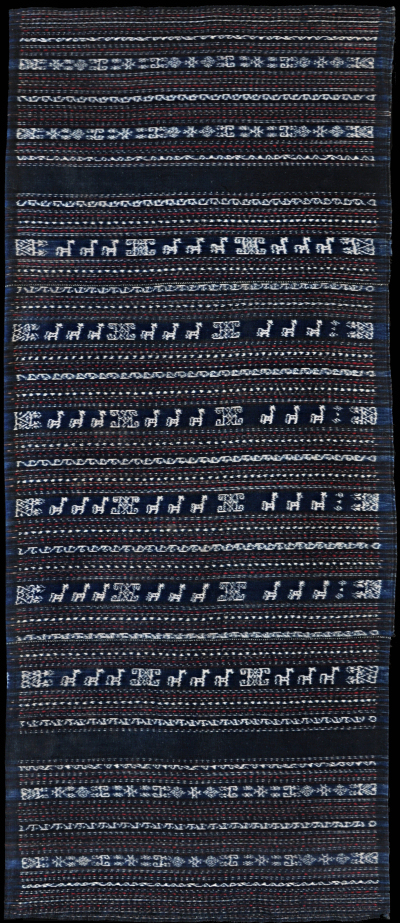| |
 
 | | | |
196 Flores Group, Ende
Zawo (sarong)  
| | Locale: | Village unknown. | | Period: | Circa 1930 | | Yarn: | Cotton, hand-spun, medium | | Technique: | Warp ikat | | Panels: | 3 | | Size: | 140 x 171 cm (4' 7" x 5' 7") LW: 1.22 | | Weight: | 760 g (26.8 oz), 159 g/m2 (0.52 oz/ft2) | | Design: | Six prominent ikat bands decorated with small horses with long tails and raised dock; a pattern resembling a backstrap loom seen from above that is common in Tanimbar; and finials that consist of interlacing lines ending in points. Four narrower bands with motifs identical to the tokeh, lizard, motif used on Tanimbar alternating with stars or starfish. Nine narrow bands with chain link or running wave motifs, and numerous fine stripes decorated with cyclamen and sienna dots or squiggles. | | Comment: | Sarong of a type named zawo mangga jara - jara meaning 'horse'. The piece, which is in immaculate condition, is almost certainly far older than it appears. The cyclamen pinstripes appear to have been done in fuchsine, one of the two earliest synthetic dyes, which was developed in 1856 and arrived in the archipelago around 1875. Clear, tight ikat work free of bleeding, revealing the hand of a master weaver. The occurrence of a motif very similar to one on a quite distant island is typical for the Indonesian archipelago, where several archaic motifs, which once had wide distribution, appear to have died out everywhere except on two or three islands. | | Background: | Chapters on Flores Group and Ende. | | Published: | Ikat Textiles of the Indonesian Archipelago, 2018.
| | Compare: | 190 233 258 | | Sources: | Similar to zawo in Khan Majlis, Indonesische Textilien, Wege zu Goettern und Ahnen, Fig. 370. Loom (breast beam) motif in Van Vuuren, Ikat from Tanimbar, p. 149, Fig. 48. Lizard motif, same work, p. 128, fig. 99. | | |

©Peter ten Hoopen, 2025
All rights reserved.
|
|


